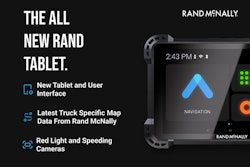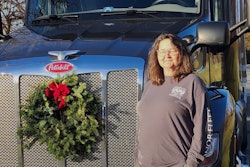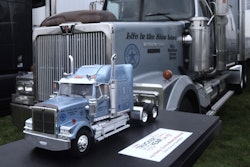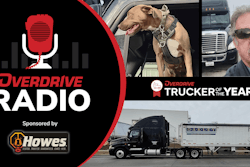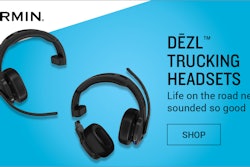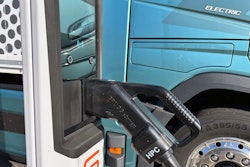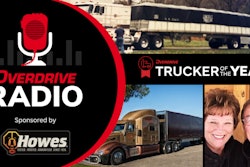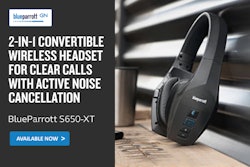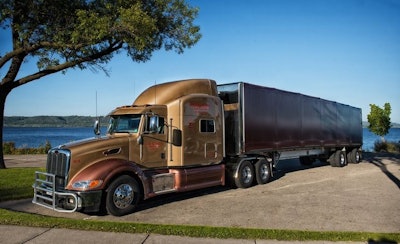
Jason Michels (pronounced like Michaels), CEO of Albertville, Minnesota-headquartered Long Haul Trucking, got his start with the company as an owner-operator in the late 1990s. Today, "I don’t pretend to have any street cred," Michels said. "I was only an owner-operator for five years."
Among those who do have plenty OTR cred is one LHT-leased owner-operator Gary Schloo (pronounced shlow). By the time Michels met Schloo, the pair loading in West Virginia on one among Michels' very first trips for the company, Schloo was well into his third decade OTR. "I followed him back to Minnesota," Michels said, talking along the way. "I probably learned as much on that run as any young owner-operator could ever be fortunate enough to learn."
First and foremost, "When you see all that revenue on your settlement, it's not all yours," Schloo told the young man. "You're going to see some big checks coming your way, and don't go blowing all that money."
Schloo's the kind of owner-operator who can tell you at any time what his overall cost-per-mile is, down to the cent -- likewise what portion of that is tied up in fuel, in tires and brakes and other maintenance, and what that all looked like decades ago, too. He's got day-minder books he's kept through the years archived in his office and shop in Austin, Minnesota, on a two-acre property he purchased early this century three miles from where he grew up.
 The shop is shown here, Schloo's Mac flatbed backed up to the door.
The shop is shown here, Schloo's Mac flatbed backed up to the door.
"I’ve got a calculator in the truck" at all times, too, Schloo said of his daily cost-evaluation routine trucking in a 2014 Peterbilt 386, bought new as a glider outfitted with a Detroit Series 60 by Fitzgerald Glider Kits. "Right now I do things by the week. I can tell you last week, last month. I can grab one of my day minders and I can tell you what I did 17 years ago for the same month. I’m kind of a nut about that. I guess I’m a numbers guy."
He's followed his own advice to young Michels, too, through the years, setting money aside for inevitable setbacks, taxes, quarterlies, equipment and real estate investment. Retirement, too. Now 74, Gary Schloo notes his more than three decades leased to LHT have been particularly good to him.
"I'm financially well-enough off to walk away if I want to, and have been for the last 10 years, really," he said, definitely since he'd formulated a plan to retire at 66 years old. He bought that 2014 386 at age 65, though, put the "Semi Crazy" legend on the back of the bunk and, when 66 came around, thought, "Well, I'll truck for three more years and retire at 69."
Then when that came around: "Oh, I'll work till 70." Then 71, 72, "and here I still am," Schloo said. "I wasn't going to work this past winter, but God there's sometimes I just love it out here," he said. "I like that self-employment check. I like the challenge of keeping the truck going."
Owner-operator Gary Schloo, nominated by Michels, is Overdrive's Trucker of the Month for April, putting him in the running for the 2024 Trucker of the Year honor.
 Overdrive's 2024 Trucker of the Year program, sponsored by Commercial Vehicle Group and Bostrom Seating, recognizes clear business acumen and unique or time-honored recipes for success among owner-operators. Through October, we're naming Truckers of the Month to contend for the Trucker of the Year honor. Finalists will be named in December, and a winner crowned early next year. Nominations continue to be sought for exceptional owner-operators, whether leased or independent, throughout the year. Nominate your business or that of a fellow owner (up to three trucks) via this link for a chance to win a custom replica of your tractor and a Bostrom seat from Commercial Vehicle Group, among other perks.
Overdrive's 2024 Trucker of the Year program, sponsored by Commercial Vehicle Group and Bostrom Seating, recognizes clear business acumen and unique or time-honored recipes for success among owner-operators. Through October, we're naming Truckers of the Month to contend for the Trucker of the Year honor. Finalists will be named in December, and a winner crowned early next year. Nominations continue to be sought for exceptional owner-operators, whether leased or independent, throughout the year. Nominate your business or that of a fellow owner (up to three trucks) via this link for a chance to win a custom replica of your tractor and a Bostrom seat from Commercial Vehicle Group, among other perks.
Road to a long-term dedicated home
By the officially tally, with Long Haul Trucking alone, Gary Schloo passed the 3 million mile mark, accident-free, some time back. LHT CEO Michels recently clocked him at exactly 3,225,661 miles, and counting. He first leased to the company in March of 1993 after several years with other outfits. He was still piloting his first owned truck, a 1984 Peterbilt cabover he purchased after 17 years in the trucking business driving for others.
 Owner-operator Schloo's first rig, a Peterbilt cabover, 1984 model
Owner-operator Schloo's first rig, a Peterbilt cabover, 1984 model
Though he drove a milk truck in local delivery right out of high school -- "I've had my chauffer's license since I was 18 years old," he said -- the Vietnam War draft had him mechanicking overseas and elsewhere on F4s for four years before he began working the roads in the summertime following a two-year college degree.
"I was going to drive truck for the summer and continue on for a four-year degree," Schloo said of his plans at the time. Fate intervened, however, as the young man drove for a small construction outfit near Austin who "had B model and R model Macks. Boy, I just loved driving those things. I just decided I wanted to keep doing it, and went out on the road."
He spent some time with "Teamster outfit" LCL Transit, he said, and the Warehouser box manufacturer for longer -- a grand total of 13 years -- as a company driver. "That was an education," he added of the work with Warehouser, running with single-axle tractors in the winter over-the-road out of Minnesota, though back home most every night.
[Related: 'Expensive wisdom' from decades trucking: Trucker of the Month Doug Viaille]
He hauled a little grain, a little meat. (Hormel's facility in Austin, he said, to this day processes 16,000 hogs a day.) He hauled steel, taking a distinct liking to flatbed work. While he was with Silver Truck Line for a brief period out of Austin, the company's owner retired and closed the business. "I didn’t feel like I was making enough money for having 17 years in the business by then," Schloo said, so he "decided to buy my own," purchasing that 1984 Peterbilt. It had 700,000 miles on it and had been overhauled when he bought it.
He leased it originally to a company that was "running a lot of tubing to North and South Carolina," he said. Tennessee, too, bringing brick back up to Owensboro, Kentucky. A year and a half in, already in a routine of tracking every expense and monitoring revenue for return on investment, he just wasn't satisfied with those results either.
He met a broker doing a certain amount of business with Long Haul Trucking. "I started moving loads from him, and he sent me up to talk to the guy that owned Long Haul," John Daniels. LHT at the time had nice equipment, Schloo said. "I didn’t think they would put my old cabover to work" leased to them.
It was March of 1993, and Schloo learned Daniels had a kind of rule related to decision-making when it comes to leasing owner-operators' equipment: "You don’t hire the equipment, you hire the man," Schloo paraphrased. "He had enough faith in me to put me to work."
He bought his own flatbed trailer with a side kit right away, and "within 11 months I was ordering a new tractor," he said, such was the return on his investment now. Part of that was the boosted revenue potential that came with trailer investment, which delivered a substantial gain to an LHT-leased owner's percentage take of any load. Schloo earns a total 90% of the gross, though he does pay liability insurance unlike in some lease arrangements. True to form, he knows just what that's costing him. "You pick up your own collision, of course," with an option to buy from the company, which he did in the early years running all 48 states.
For the past nearly two decades, though, Schloo's been running a dedicated lane for customers between Minnesota and Wisconsin, well within a 500-mile radius. He's set up his physical damage outside of the policy available through Long Haul and has limited coverage within a 500-mile radius, for substantial savings over his prior nationwide coverage. "I've gone to Great West Casualty," he said, with the 2014 386. "I get a better rate with that 500-mile radius."
[Related: Small Fleet Champ John McGee Trucking: Almost 100% uptime for 24/7 oilfield biz]
Destined for small-business ownership
Since Schloo met him in 1993, LHT's owner John Daniels has retired, selling LHT to the company's employees, a story told in Overdrive sister fleet publication CCJ's "Innovator" series in 2021. Owner-operators "don’t have any piece of Long Haul" directly, Schloo said, but employee ownership there "has been a good situation for the owner-operators, too," who make up a majority of the fleet.
Daniels probably had good reason to see future business success in owner-operator Schloo, even with that old cabover. In some ways, the man was destined for it. His grandfather immigrated to the United States at age 16 in 1890 or '91, "and he was self-employed." Schloo said. "He was a farmer, and my dad was a farmer after him."
Schloo was single (unmarried) when he bought that first truck. "It was a challenge, but it made me more ambitious," he said of the move. "In some respects, I'm the worst person that I ever worked for," the toughest boss he ever had in the push for self-employed success. "I think as an owner-operator sometimes you have to be."
He took no shortage of loads any sane person wouldn't be happy hauling. Deer hides, cow hides. "You took them because the money was good, and it went where you wanted to go," he said. They were messy business, though. "You can haul a load of deer hides out of Wisconsin to New York, and what you end up with is three inches of contaminated salt on the floor of your aluminum trailer," washout necessary.
"Same with cow hides," he added, among the ugliest loads in his memory one consisting of No. 1 and No. 2 render hides. "The most awful things I ever hauled." Pulled on a flatbed with removable sides and an open top, "they were from dead animals picked up on the farm already dead," he said. You could cut the stench with a knife. "But it was a good-paying load."
Owner-operator Schloo was among the first at LHT to transition to soft-side flatbeds (curtainsides, they're sometimes called), fairly early in his time at the company, and a formidable piece of company sales' bid to capture what otherwise would have been dry van freight at the time. As he was having his first such trailer built and outfitted, a salesman at LHT by his recollection told him, “When you get that trailer built, I want to take it down to a customer. I think we can get some freight out of that customer.'"
The customer in question had lost a carrier among its stable and was running to New Jersey on a regular basis. "Basically, it was van freight," Schloo said, and the salesman "felt we could put it in our trailer."
With Schloo's assistance LHT did get a contract with the customer within a few weeks of the visit. "I hauled out of that customer for eight years" before the warehouse closed, he said. "I was told we hauled more than 10,000 loads for that customer over eight years," a big part of LHT's growth at the time. "We’ve really developed a good customer base with these trailers."
[Related: Bitterman Trucking bounces back to build on long, strong trucking legacy]
Through the years, said current LHT CEO Michels, Schloo's been a "great customer-facing owner-operator. He’s a super-professional, always. I haven’t seen him today, but he's probably got a nice pair of blue jeans on and a button-down dress shirt."
Recent conversation with Schloo around the March anniversary of his lease with LHT brought back memories for Michels not just of his early education on that West Virginia-Minnesota run. Michels pulled out a file of "handwritten letters" to him from Schloo illustrating "all the input he's had over the years ... about customers, rates, and profitability," he said. Writing the letters, Schloo was "making sure I was paying attention."
The owner-operator was, that's certain. The move to the soft-side flat wasn't without hiccups on certain loads. Some shippers took convincing, like the steel maker in Connecticut where owner-operator Schloo showed up for a load of wire -- "we called it 'poverty wire' because it didn't pay much," he said. Nonetheless, "I pulled in there to load and the guy said, 'We can't load your trailer.' I had to get out and show them that the trailer would open from the front or at the back. ... You certainly had a little pushback because people didn't realize what they could do."
The advantages were clear, though, for him. "A lot of customers are pretty touchy about throwing tarps over their stuff," he said. "I have seen some pretty fancy freight on these trucks." It's a time saver, too. "You’re putting the steel or aluminum or a machine -- you’re putting it on the trailer, tying it down, securing it, and going down the road" with the freight still protected from the elements, no need for a complicated tarp job.
Before making the initial decision to invest in a soft-side kit, "I thought, OK, if I built one of these trailers, how much freight would I give up by not being able to haul a lot of the stuff." The company pulled loads of sunflower seeds at the time, one among those he'd have to give up, he said. "By looking back in my books," though, he found that "the worst load that I hauled in [the prior] six months was the only load that I couldn’t put on the trailer."
[Related: Thriving on the challenge: Trucker of the Month Candace Marley]
Backstopping the business: Relationships, insurance
Owner-operator Gary Schloo's wife, Terri, today works part-time as a caregiver with disabled people, yet she's also "my bookkeeper, and my kind of IT person," Schloo said. "She’s the computer person. I’m not much of one. She keeps everything straight at home, and does a great job of keeping the books. ... You can't do this business without" that kind of support at home.
The pair met early in Schloo's journey into self-employment. He rented space in a shop at the time, and "I'd work on my cabover until three o'clock in the morning" occasionally, he said, at which point he'd make his way to a nearby overnight restaurant for sustenance. Terri was working the third shift there. "That's where I met her." It's "the classic old-trucker-and-the-waitress thing, right?"
They've been together since.
 Gary and Terri Schloo at home
Gary and Terri Schloo at home
Among advice Michels remembers from Schloo by 1999: "Make sure you pay your taxes," he said, including quarterlies. Schloo's reaping the benefits of all those years of self-employment today, drawing on Social Security.
He and Terri both are covered by Medicare now, though it hasn't always been that way. Terri was employed at Mayo Clinic and carried the employer-provided insurance for both of them for much of their time together. That is, before Schloo was eligible for Medicare.
That insurance has proved an important backstop time and again.
He "had back surgery in 1994" with a brand-new truck on order. He ruptured an Achilles tendon in 1997. He spent eight days in the hospital with blood clots in his lungs. In 2009, then, amid the slow run out of the perhaps the toughest of tough freight markets in history, owner-operator Gary Schloo had a heart attack.
"That shakes you a little bit," he said, but fortunately, he didn't have heart damage, according to the doctor who oversaw his bypass surgery. He remembers the doctor telling him "I gave you another 20 years," he said. He was shaken, but "you don't surrender to it," he said. "You get out there and get back at it. I had a lot of encouragement from a lot of people."
He was down and out of the truck, sure, but only for a mere 10 weeks.
Most importantly, he was prepared, and 15 of those 20 years on, "I take care of myself" with annual visits to a cardiologist ahead of his annual DOT physical, he said, important insurance against running into the brick wall at the end of the run.
In fact, asked for his best piece of advice for owner-operators coming up in today's world, almost all of Schloo's thoughts fall into the insurance bucket in one way or another.
- Act like you're broke for the first three years. "Pay down your debt," he said, and "things will be a lot easier."
- Pay ahead on your truck note. It's come in handy as insurance for Schloo a time or three. "If you’re ahead on your loan, always stay ahead," he said. "You can always call the bank" and request to skip a payment if the need arises.
- Really, really, really take care of your truck. "Don't let things go to where you're at the mercy of some outfit out on the road."
- Invest in income-replacement insurance such as disability coverage. "I had disability before I became an owner-operator, but I increased it after. I highly recommend it -- at least enough to cover your home bills" if you can't work. Illness, injury and "accidents can take you down."
 Enter your business in Overdrive's Trucker of the Year competition for a chance to win a seat from program sponsor Bostrom Seating, among other perks and prizes.
Enter your business in Overdrive's Trucker of the Year competition for a chance to win a seat from program sponsor Bostrom Seating, among other perks and prizes.
Clearly, though, such help's a two-way street, and owner-operator Gary Schloo has done the work to help himself. He's got the income and health and family life to prove it, still trucking full-time at 74.
As LHT's Jason Michels put it, "I hope to be where he is at 70-plus. He’s been a major asset to Long Haul Trucking," as "somebody who treats being an owner-operator like a professional business. If we could clone him we’d have a hundred more of him tomorrow."
 The shingle hung out on Schloo Trucking's shop on "Gary and Terri's Tired Two Acres" in Austin.
The shingle hung out on Schloo Trucking's shop on "Gary and Terri's Tired Two Acres" in Austin.
[Related: They said he'd fail: Overdrive's Trucker of the Year, Jay Hosty]

